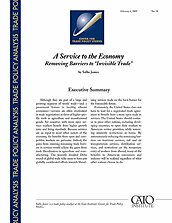Fortunately, the United States does not have to wait for a negotiated trade agreement to benefit from a more open trade in services. The United States should continue to press other nations, including developing countries, to open their markets to American service providers, while removing unwieldy restrictions at home. By autonomously reducing the remaining barriers on maritime services, rail and air transportation services, distribution services, and restrictions on the temporary entry of workers from abroad, many of the benefits to American consumers and industry will be realized regardless of what other nations choose to do.
A Service to the Economy: Removing Barriers to “Invisible Trade”
Although they are part of a large and growing segment of world trade-and a prominent feature in healthy, vibrant economies-services are often overlooked in trade negotiations in favor of higher-profile trade in agriculture and manufactured goods. Yet countries with more open services markets benefit from higher growth rates and living standards. Because services are an input to most other sectors of the economy, the benefits from open and competitive markets are pervasive. Indeed, the gains from lowering remaining trade barriers in services would eclipse the gains from trade liberalization in agriculture and manufacturing. The recently derailed Doha round of global trade talks seem to have put globally coordinated efforts towards liberalizing services trade on the back burner for the foreseeable future.

This work is licensed under a Creative Commons Attribution-NonCommercial-ShareAlike 4.0 International License.

